Reviews
International Piano Magazine 2012 May/June
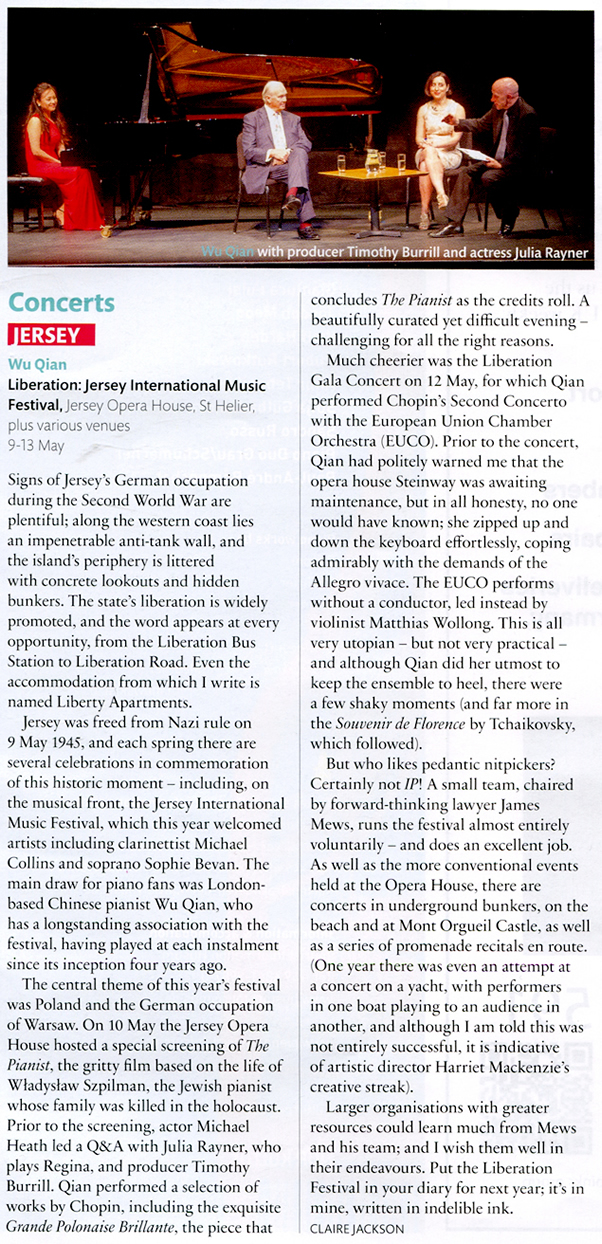
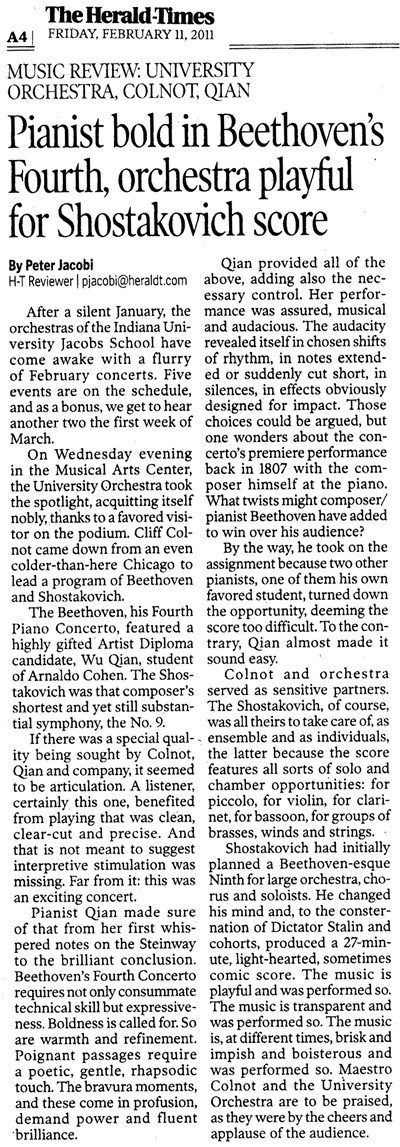
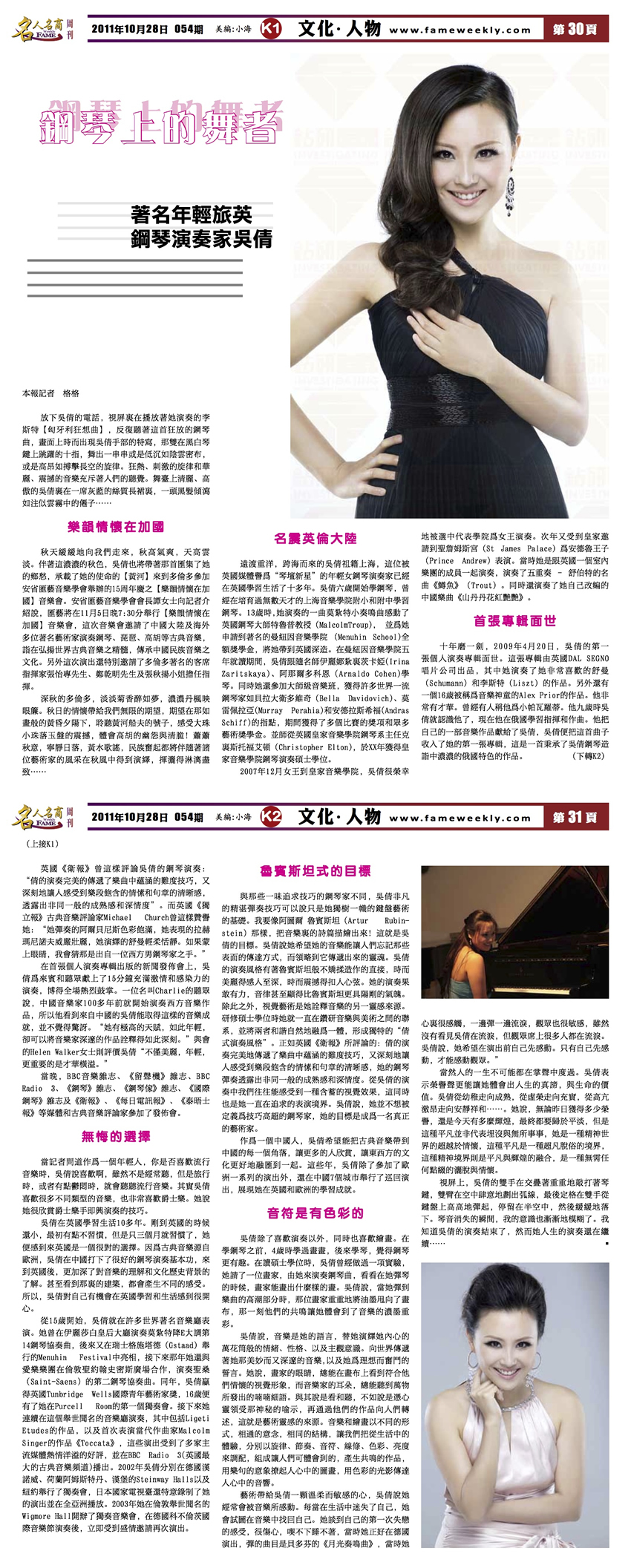
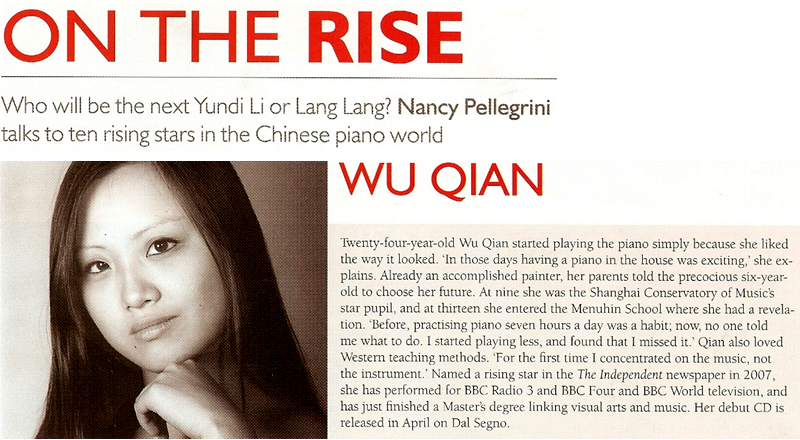

Kreisleriana/Svyatogor's
This article originally appeared in Issue 33:2 (Nov/Dec 2009) of Fanfare Magazine. Click here to view original review
Wu Qian is a young woman of only 25 years who studied at the Shanghai Conservatory and is currently finishing her master’s degree at the Royal Academy of Music in London. If this is any guide, she is certainly one to keep an eye on, for her interpretative ability is quite mature for one so young, displaying none of those common traits we often see in performers of young age, like rushing through phrase endings and artificial imposition of dynamic exaggerations. Her performances come from deep inside, an intuitive and completely honest approach that resonates with us because of her integrity as an artist.
Lest I seem to be gushing, let me add fuel to the fire. This is one of the most spectacular readings of Kreisleriana that I have ever heard. And why shouldn’t it be the product of a young lady’s vision? Schumann, after all, was only three years older than Qian when he penned this flowery and tempestuous paean to his love for Clara, using the fictional character of Johannes Kreisler, “an eccentric, wild, and clever Kapellmeister” according to the composer, as the vehicle for the two opposing personalities of Florestan and Eusebius. Each piece in this character set explores this opposition, somewhat akin to Schumann’s own fickleness in personality, and the work positively scared Clara, who would only play portions of it in concert and wondered if the creator of this music was actually going to be her husband! Qian intuitively understands the dichotomy involved in a proper presentation of this music, and her fiery reading, explosively eloquent while radiantly persuasive turns out to be perhaps the best rendition since Horowitz, and maybe better.
As a tribute to one of her generation, Qian gives us an excellent performance of Alexander Prior’s Svyatogor’s Quest, a piano tone poem based on the life of the legendary Slavic semi-God whose two incarnations represent both paganism and Christianity. This is wide-open music with a distinctly bold and epic sound quality to it. While I can’t claim that every minute of this 20-minute work grabbed my attention, it is certainly a worthwhile piece that demands more performances. It was during the affair with Countess Marie d’Agoult that Franz Liszt began the first two of his three collections titled Years of Pilgrimage. While Switzerland claimed his initial attention, it was Italy that commanded the second book, and here Qian offers perhaps his most famous composition in the set, the Sonetto 104 del Petrarca. Too many players perform this music without the idea that they are based on earlier song settings, but young Qian makes no such mistake. Her reading is Lisztian to the fore, masculine in physical prowess but feminine in her ability to dissect the two opposites in the Petrarch poem: lacking peace yet refusing to make war. The work requires a delicate nuance between these two poles, and the capacity to shift the tone quickly. While her effort doesn’t top those of some of the greater Liszt pianists, it is a most creditable effort. The Hungarian Rhapsody No. 12 is another work that, like all of the rhapsodies, requires a lot of starts and stops on quick notice. Qian’s is as convincing and exciting as any I have heard. Add to this package some of the most vivid and spectacularly captured piano sound I have even heard, and you have a highly digestible and eminently desirable release.
Steven E. Ritter
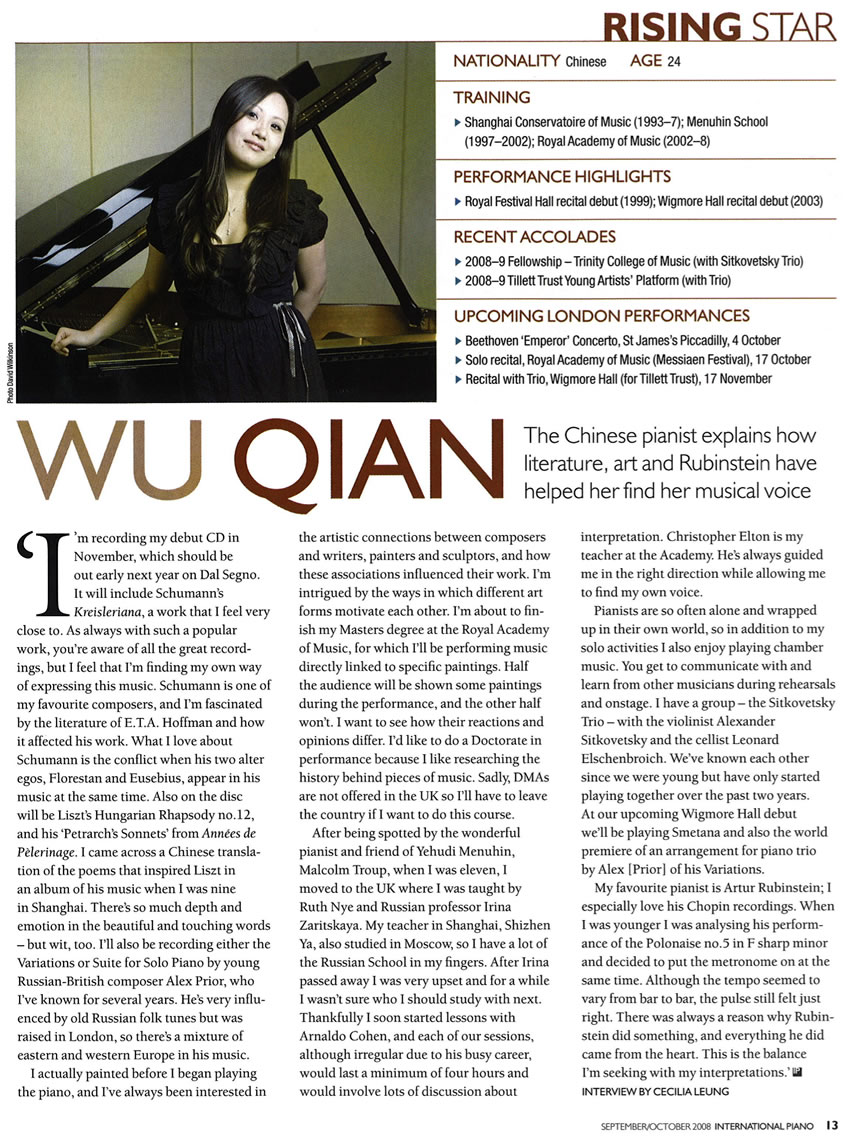
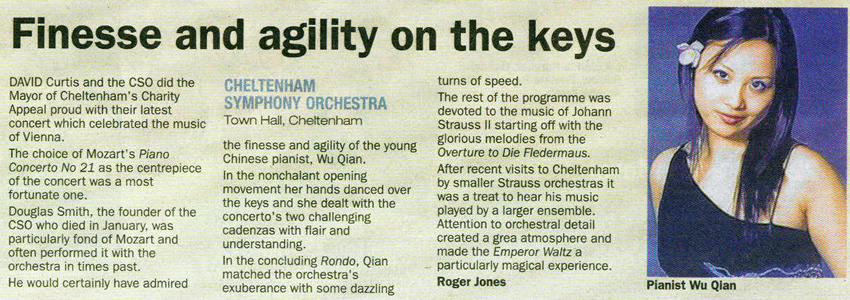
Independent Review
Wu Qian, Purcell Room, Wigmore Hall, London
(Rated 4/ 5 )
Thursday, 7 February 2008
This has been a good week for the 23-year-old pianist Wu Qian, who was born and brought up in Shanghai, then trained at the Menuhin School and the Royal Academy of Music. At the Southbank Centre, she made her debut as part of a new piano trio with violinist Alexander Sitkovetsky and cellist Leonard Elschenbroich; at the Wigmore, she opened the Young Artists' Platform season with a mini-recital of Brahms and Liszt.
If piano trios are not as common as string quartets, it is partly because the trio repertoire is more limited, and this presumably lay behind their choice of Rachmaninov's rarely performed Trio élégiaque as an opener. It's a youthful work with a characteristically grand sweep, and these players gave it the best possible advocacy, with Wu as their anchor. The third movement of the Mendelssohn trio that followed had to go like the wind, but Wu's fearless pianism was well equal to that challenge. By winding up with Schubert's great Piano Trio in E flat, this fledgling ensemble showed that they mean business: their performance was reminiscent of the Beaux Arts Trio in its heyday. Throughout that evening, Wu impressed by her sense of stylistic bienséance, subtly adjusting her touch to the composers' different demands. Beginning her Wigmore concert with Brahms's Sechs Klavierstücke, she showed that responsiveness again. If Brahms described these majestic pieces as "cradle songs of my sorrow", Wu rocked that cradle with such a Brahmsian hand that the emotions came across in close-up. After that came one of Liszt's "Petrarch Sonnets", followed by his 12th "Hungarian Rhapsody": perfect showcases for her formidable technique, but here short on the mercurial lightness to counteract the heavy-duty circus stuff.
The clarinettist Sarah Williamson and pianist Catherine Milledge provided the concert's second half, sandwiching Arc de soleil, a new work by Joseph Phibbs, between Poulenc's clarinet sonata and the salon brilliance of Weber's Grand Duo Concertant. Phibbs set out to explore the versatility both of the clarinet and of this superb player, an ambition realised in the fragmented, crystalline brightness of his piece.
Reviewed by Michael Church
“A young pianist whose playing is pure musical poetry” She looks set for a great future”
Tunbridge Wells Courier October 2002
“Excellent interpretation… Heavy cluster chords freely and seamlessly alternated with a delightfully light spiccato (Schnittke’s Improvisation and Fugue)..we have by no means heard the last of Wu Qian”
Cyprus Mail February 2002
“A compelling, thoughtful performance, entirely free of artifice and profoundly impressive throughout”
Tunbridge Wells Courier June 2001
“Wu Qian is surely destined for stardom….She mixed deep colours in Elliot Carter’s Night Fantasies but played nothing more heart-stoppingly exciting than Hallgrimson’s Victory Boogie-Woogie.”
Rick Jones, Evening Standard January 2001 (Park Lane Group Series)
“Although only 16, the Chinese pianist Wu Qian plays with a mastery and stylistic awareness well beyond her years”
Barry Millington, The Times January 2001 (Park Lane Group Series)
“She showed great rhythmic intensity and precision”
Laurence Hughes, The Independent January 2001 (Park Lane Group Series)
“At 16, Wu Qian is the youngest participant this year, yet the command and control she brought to her programme was breathtaking.”
Matthew Rye, The Daily Telegraph January 2001 (Park Lane Group Series)
“Qian’s performance (of Elliott Carter’s Night Fantasies) transcended the work’s extraordinary difficulties, illuminating the poetry of Carter’s vision with laser-like clarity. Throughout her performance there was an unmistakable sense of a personal, emotional involvement with the music, revealing astonishing musical maturity.”
Tom Service, The Guardian January 2001 (Park Lane Group Series)
“It was ultimately Wu Qian who rose to the challenge with a programme of Beethoven’s Les Adieux and Halgrimsson’s Three Mondrian Pictures which demonstrated a natural and perceptive artistry that quite stepped outside the competition arena, revealing the music in a sincere and unassuming manner. Her eventual success in the showcase final has provided the Tunbridge Wells competition with an ambassador of many significant virtues – not least great promise.”
James Lisney, Piano September/October 2000
“..a stunning and ambitious programme of Bach, Franck, Prokofiev and Shchedrin… Sparkling performance of the Mozart Concerto”
Piano Journal No 59 Summer 1999
CD Release
“Her fiery attack of Kreisleriana’s fugue and the work’s wraith-like endi6ng are splendidly realised.” Gramophone Magazine
"The Chinese pianist starts her first recital disc with a confidently, unmannered reading of Schumann’s Kreisleriana.” The Times
Buy Now!